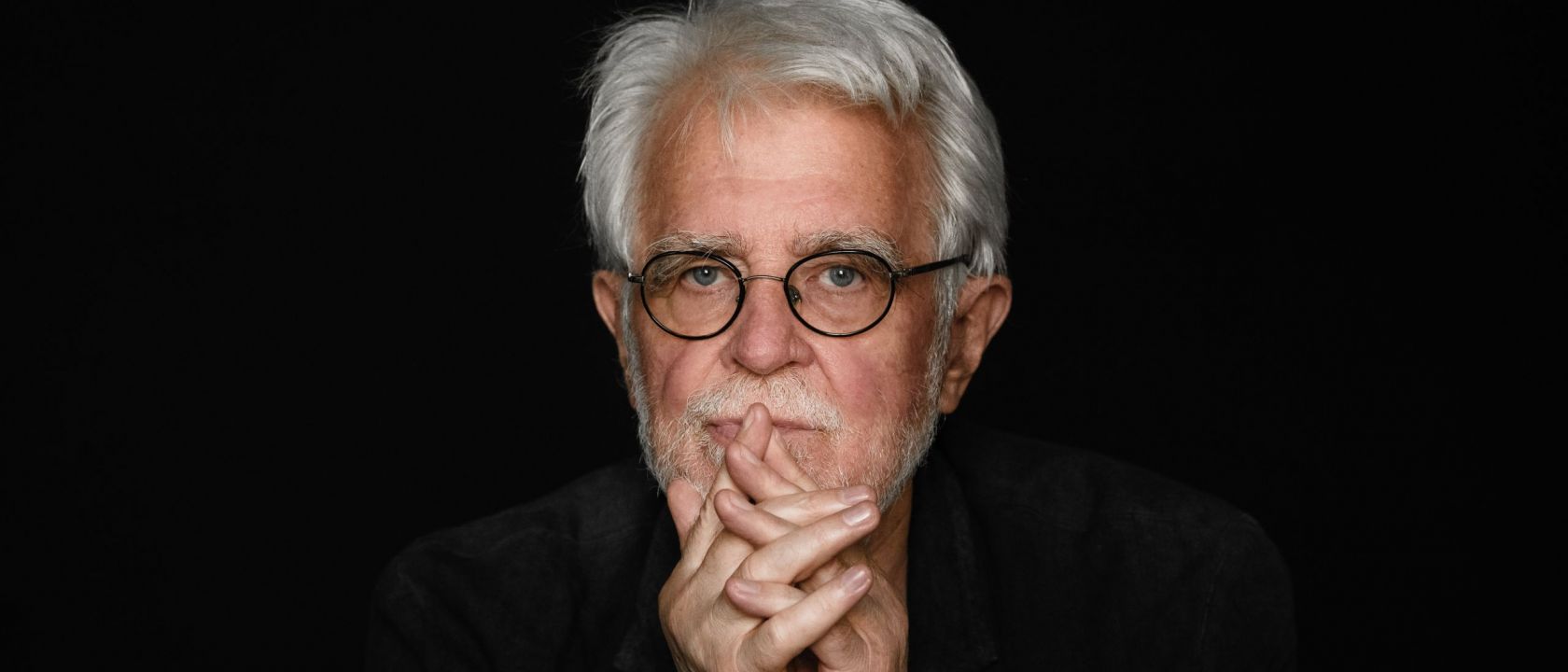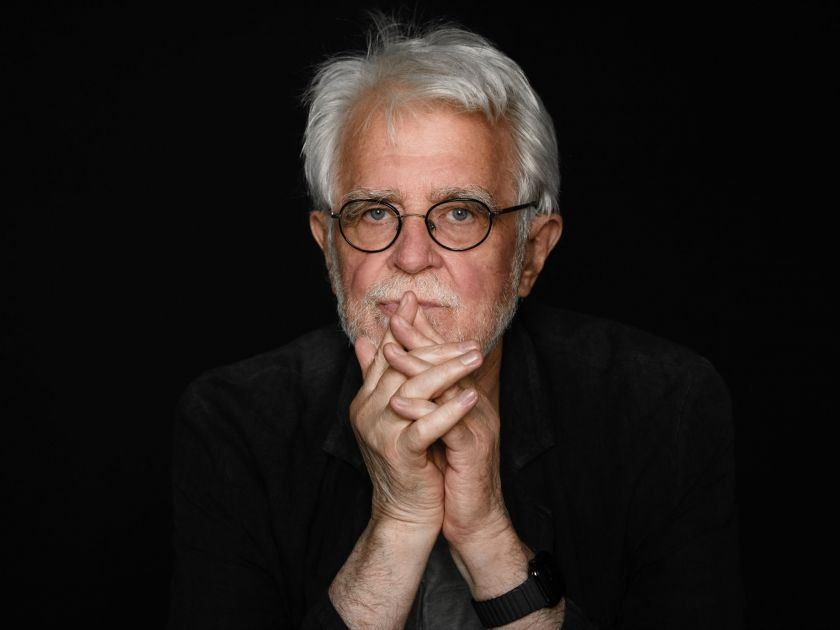Krystian Lupa

Source: Jaunimo Teatras
KRYSTIAN LUPA is a Polish theatre director, set designer, playwright, translator and pedagogue. He has been called the greatest European living theatre director (www.culturecongress.eu. Retrieved 2016-10-24).
Lupa studied physics at the Jagiellonian University in Krakow, between 1963-1969 he studied graphics at the Kraków Academy of Fine Arts, also film directing at the National Higher School of Film in Łódź and finally, theatre directing at the Ludwik Solski Academy for the Dramatic Arts.
Kantor, Swinarski, Witkiewicz: masters of the path
In Lodz he started to collaborate with Konrad Swinarski, and was influenced by the works of Tadeusz Kantor. Lupa made his professional theatre debut in 1976 with a production of Sławomir Mrożek’s Rzeźnia (The Slaughterhouse) at the Teatr im. J. Słowackiego in Kraków. For his thesis project in directing, Lupa chose Stanisław Ignacy Witkiewicz’s Nadobnisie i koczkodany (Dandies and Frumps) (1977), a text he had worked on earlier.
After the studies he started working in Old Town Theatre in Krakow and also in Cyprian Kamil Norwid Theatre in Jelenia Góra. In Jelenia Góra Lupa developed his specific method of working with actors, a method that he would ultimately apply more broadly, not solely to those productions that were his original creations. His collaborators of the time referred to his method of developing productions as ‘laboratory rehearsals.’
Musil, Bernhard: Austrian fascinations
Krystian Lupa has enjoyed a relationship with the Stary Teatr in Kraków since 1980, and created some of his most exceptional productions there. He began his work at this theatre by staging Powrót Odysa (The Return of Odysseus) by Stanisław Wyspiański (1981), a play to which he would return in 1999, staging it once more at the Teatr Dramatyczny in Warsaw. Lupa also took on Austrian literature for the first time while at this Kraków theatre. In creating his original production titled Miasto snu (City of Sleep), Lupa drew inspiration from Alfred Kubin’s novel Po tamtej stronie (The Other Side). In 1988 Lupa directed Robert Musil’s Marzyciele (The Dreamers), a production which explored the deterioration of ideals through the prism of an individual who remains in a constant search for his identity.
Lupa would once again look to Musil two years later when he adapted and mounted a production of this author’s great, epic work – the essayistic, philosophical novel Człowiek bez własciwości (The Man without Qualities). Mounted as the thesis production for students of the Acting Department of the State Higher School of Theatre in Kraków, Lupa titled this staging Szkice z Człowieka bez własciwości Roberta Musila (Sketches from Robert Musil’s The Man without Qualities). The director once again adapted Austrian prose for his Malte albo tryptyk marnotrawnego syna (Malte, or the Prodigal Son’s Triptych), a staging inspired by the work of Rainer Maria Rilke.
Krystian Lupa first drew on the work of Thomas Bernhard in 1992, creating a production based on his own adaptation of the author’s novel Kalkwerk. This staging quickly gained the reputation of being a great metaphysical treatise, while exceptional acting simultaneously made it a shocking picture of the physical and mental sufferings of a man who seeks meaning in a world ruled by routine. Lunatycy. Esch, czyli anarchia (The Sleepwalkers – Esch, or Anarchy), a production from 1995, was yet another adaptation of a German language original, namely, the second part of Austrian author Hermann Broch’s great prose trilogy. Encompassing the period from the close of the 19th century to the end of World War I, Broch’s The Sleepwalkers describes the deterioration of values held sacred until this period, a deterioration caused by processes of social disintegration. In 1988 Lupa staged the second part of his theatrical adaptation of The Sleepwalkers, subtitling it Hugenau, czyli Rzeczowość (Hugenau, or Objectivity).
In staging Bernhard’s The Siblings (Ritter, Dene, Voss), Lupa took a similar approach to that which he applied in mounting the same author’s Kalkwerk. Ritter, Dene, Voss is about the life of Austrian philosopher Ludwig Wittgenstein, and in his production Lupa examined the routine behaviors of three siblings while highlighting the emotional conflicts that absorb the would-be genius. The director also turned to his Austrian fascinations at the Teatr Polski in Wrocław, with which he has been collaborating since 1996. It was at this theatre that he staged Thomas Bernhard’s Immanuel Kant (1996), The Lady and the Unicorn based on Hermann Broch’s short story Hanna Wendling (1997), and Kuszenie cichej Weroniki (The Temptation of Quiet Veronica) based on a story by Robert Musil (1997). Most recently, at the Teatr Dramatyczny in Warsaw, Lupa directed Bernhard’s Extinction, based on his own translation (2001) – a production in which he explored issues of memory, attempts at erasing one’s biography, and the ability of individuals to be born anew.
Dostoyevsky, Chekhov: European state of mind
Lupa brought works of Russian literature to the stage. He prepared Bracia (Brothers) – based on Fyodor Dostoyevsky’s The Brothers Karamazov – as the thesis production of fourth year acting students at the State Higher School of Theatre in Kraków, where Lupa has been teaching since 1983. He readapted this novel for the stage in 1990 at the Stary Teatr in Kraków, and developed a new version of The Brothers Karamazov, turning this work into a great theatrical fresco, in 1999. Working with students of the Acting Department of the State Higher School of Theatre in Kraków under the program of thesis productions, the director has twice staged texts by Anton Chekhov, adapting this author’s play Platonov into a production consisting of two parts and titled Płatonow Wiśniowy i Oliwkowy (Cherry and Olive Platonov), and two years later staging The Three Sisters. He has also created a stage adaptation of Mikhail Bulgakov’s The Master and Margarita ( 2002), and prepared a production titled Azyl (Asylum), based on Maxim Gorky’s The Lower Depths (2003), at the Teatr Polski in Wrocław.
When it comes to contemporary plays, Lupa mounted productions of Austrian author Werner Schwab’s Prezydentki (First Ladies) as well as Stosunki Klary(Clara’s Relations) by German playwright Dea Loher. In 2004, Lupa did a production entitled Niedokończony Utwór na Aktora Wedlug ‘Mewy’ Czechowa – Sztuka hiszpańska Yasminy Rezy (Unfinished Work for An Actor Based on Chekhov’s ‘The Seagull’ – The Spanish Play of Yasmina Reza) which premiered on March 27th, 2004, at the Teatr Dramatyczny in Warsaw. In 2006 Lupa tackled another one of Bernhard’s plays – Na Szczytach Panuje Cisza (Over All the Mountain Tops).
In 2004 he brought two performances to the stage of the Stary Teatr in Kraków. The first, which premiered in Athens at the Hellenic Festival in 2004 (it’s Polish premiere took place in 2005 at the Old Theatre) is Zarathustra based on Friedrich Nietzsche’s philosophical novel Thus Spoke Zarathustra and Einar Schleef’s Nietzsche. Trilogy. Full of rigour and drama, Lupa’s adaptation of Zarathustra showed the spiritual journey of a man who asks about the point of human existence, the point of an existence without God, about the possibilities and limits of human experience. The second play he laid out reflections about the essence ofcreation, the artist’s consciousness and the role of chance in art. He also put on stage Factory 2 based on his own script and inspired by the life and work of Andy Warhol and the phenomenon of his legendary studio (2008).
Since 2009 he has been working on the Persona.Triptych devoted to intriguing female personalities across borders and generations. Lupa’s focus is on three iconic figures from the Twentieth Century: Marilyn Monroe, Simone Weil and George Gurdjieff. In 2011, his Waiting Room premiered at Wrocław’s Polski Theatre. 2012 saw the production of Lupa’s City of Dreams, an adaptation of Alfred Kubin’s novel The Other Side, brought to the stage together with the TR Warszawa theatre group. The official premiere staging of the play took place at the Theatre de la Ville in Paris.
Theatre of psychological extremes
Lupa is a master at creating internally coherent stage realities. He often translates and adapts the texts which he stages, simultaneously designing the scenery and directing these productions. The quality of Lupa’s theatre derives from strong acting, which is often deemed “invisible” or “transparent,” made so by actors who unite almost completely with the characters they play. Most often, characters so thoroughly take over the actors that the smallest psychological nuances and inner contradictions become perceivable in the intimacy of his productions.
In 2014 Lupa staged Woodcutters based on Thomas Bernhard’s prose at the Polish Theatre. The performance was recognised by the audience and critics as the best play of the season in Poland. In 2015 Lupa staged Heldenplatz (Heroes’ Square), the last play by Bernhard, at the Lithuanian National Drama Theatre in Vilnius. This time Lupa creates a play based on a scandalous drama from 1988, telling about antisemitism and Austrian collaboration with Hitler. The director depicts hypocrisy of the society who has created reality they live in and sincerely hate. The performance was later presented at the Avignon theatre festival and received the prize for the best foreign staging presented in France in 2016.
In 2017 Lupa directed Process based on The Trial by Franz Kafka at the Nowy Teatr in Warszaw. In Poland, where the conservative powers that be continue to lead the country down increasingly kafkaesque avenues, the director Krystian Lupa tackles the work of Franz Kafka for the first time. He brings us this adaptation of The Trial, his inimitable touch in tact. – was stated by the Festival d‘Automne in Paris. The Process was sucesfully presented at the international festivals France, Austria, China, Russia.
In 2020 Lupa turned to writing of the prominent contemporary German writer W.G.Sebald. He made original adaptation of Austerlitz, the last novel of W.G.Sebald in 2020 at the Jaunimo Teatras in Vilnius – an epic meditation on the trauma of the Holocaust and its consequences for the individual’s destiny. Lupa continue exploration of human’s destiny in a historical fractures following W.G.Sebald writing in his most recent international production The Emigrants to be premiered at the Odéon Theatre in Paris in the beginning of 2024.
Photos and Videos

